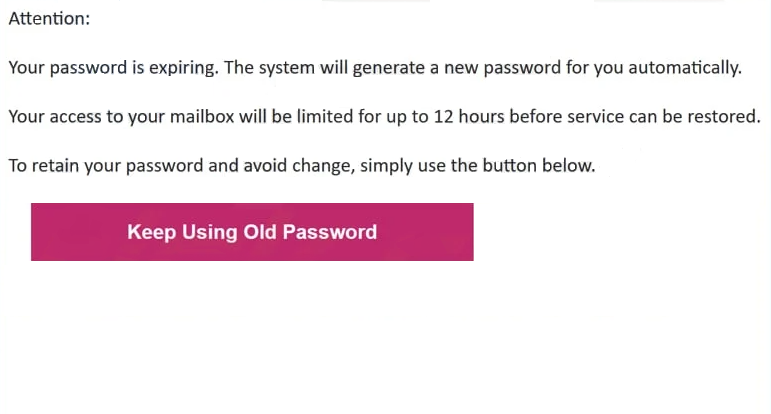Your Password Is Expiring is a phishing scam that tries to steal users’ email login credentials. The email claims that your email password will expire soon and a new one will be generated. This will supposedly cause access to your email to be restricted for up to 12 hours. The email claims that you can prevent this from happening by clicking on the displayed button. If users fall for this, they will reveal their email passwords to malicious actors.
Email accounts are a hot commodity among cybercriminals because they’re essentially a gateway to other users’ accounts. An email address is required whenever users create an account on any platform, so by hijacking a single email account, malicious actors could hijack hundreds of other accounts. This can have very serious consequences. For example, a hijacked email account could allow cybercriminals access to social media accounts. They could then ask users’ contacts to lend them money, for example.
“Your Password Is Expiring” phishing email is a fairly generic campaign. How effective it is may be difficult to determine but some users will fall for it. It claims that if users want to keep their passwords, they need to click on the button. If they click on it, they will be taken to a phishing site that asks for login credentials.
It’s worth mentioning that users will be shown different sites, depending on what email provider they use. For example, users using Gmail would be taken to a site imitating Google. If users type in their credentials, they will be transferred to the malicious actors operating the phishing campaign.
Attention:
Your password is expiring. The system will generate a new password for you automatically.
Your access to your mailbox will be limited for up to 12 hours before service can be restored.
To retain your password and avoid change, simply use the button below.
Keep Using Old Password
For most users, the “Your Password Is Expiring” email is obviously phishing. Email providers do not and cannot change passwords automatically, as the email is claiming. Passwords also do not expire. Users can always ignore these types of emails, as they will always be phishing.
How to recognize a phishing email?
The majority of users are targeted by generic phishing emails, which makes them easy to identify as such. Phishing emails are made to appear like they’re sent by legitimate companies in order to trick users. For example, this “Your Password Is Expiring” phishing email wants you to believe that it was sent by your email provider. This is why you need to be very careful with all emails you receive, even if they look very convincing.
The way you are addressed in an email can often help identify whether it’s legitimate or malicious. This “Your Password Is Expiring” email does not address you by name, which is an immediate red flag. Legitimate emails usually address users by name because it makes the email seem more personal. Absent names or generic words like User or Customer are usually a sign of spam or malicious emails. Phishing emails are also usually full of grammar/spelling mistakes, which makes it very easy to identify them. You will very rarely see any mistakes in legitimate emails because that looks very unprofessional.
Phishing emails usually claim that there’s something wrong with your account to force you to engage with the email. The emails usually claim that if they do not engage with the email or take some action, they will be inconvenienced in some way. “Your Password Is Expiring” phishing email, for example, claims you wouldn’t be able to access your inbox for up to 12 hours. We strongly recommend that you do not click on any buttons or links in emails. If an email claims that there’s an issue with your account, access the account manually instead of clicking on the link in the email.
Lastly, when logging in to an account, always check the site’s URL. A lot of the time, phishing sites are well-made and closely imitate legitimate sites. But no matter how well-made they are, the URL will never be the same. Malicious actors sometimes use certain tricks to make the URLs seem more legitimate (e.g. using “r” and “n” to make them resemble “m”) but as long as you pay attention, you will be able to notice that it’s not right.
Remove “Your Password Is Expiring” phishing scam
If it lands in your inbox, simply remove “Your Password Is Expiring” phishing email. If you have fallen for this phishing email and given malicious actors your email login credentials, you need to change your email password immediately. You should also change all the passwords of accounts that are associated with the email account. If you can no longer access your email account, contact your provider to see if it’s possible to recover it.
Site Disclaimer
2-remove-virus.com is not sponsored, owned, affiliated, or linked to malware developers or distributors that are referenced in this article. The article does not promote or endorse any type of malware. We aim at providing useful information that will help computer users to detect and eliminate the unwanted malicious programs from their computers. This can be done manually by following the instructions presented in the article or automatically by implementing the suggested anti-malware tools.
The article is only meant to be used for educational purposes. If you follow the instructions given in the article, you agree to be contracted by the disclaimer. We do not guarantee that the artcile will present you with a solution that removes the malign threats completely. Malware changes constantly, which is why, in some cases, it may be difficult to clean the computer fully by using only the manual removal instructions.
